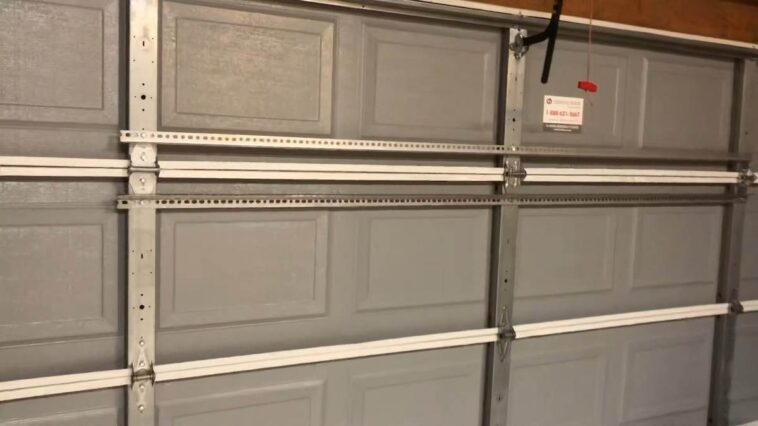Affiliate Disclosure: We may earn money or products from the companies mentioned in this post.
Imagine this scenario: It’s a busy Monday morning, and you work late. You hop into your car, press the button on your garage door remote, and wait for the familiar sound of your garage door smoothly gliding open. But instead, you’re met with a cacophony of grinding noises, and the door only inches up a few inches before shuddering to a halt. Frustration sets in as you realize that your garage door desperately needs repair.
Garage doors play a vital role in our daily lives, providing security, convenience, and protection for our vehicles and belongings. However, like any other mechanical system, they can experience wear and tear over time. Recognizing the signs that indicate your garage door requires repair is crucial to address issues promptly, avoiding safety hazards, and extend your garage door’s lifespan.
What Are the Signs That a Garage Door Should Be Repaired?
From unusual noises and slow movement to misalignment and motor problems, we will discuss each sign in detail. Whether you’re a homeowner looking to maintain your garage door’s functionality or a curious individual interested in learning about garage door maintenance, this guide will provide you with valuable insights.
1. Unusual Noises and Vibrations
One of the most evident signs that your garage door needs repair is the presence of unusual noises and vibrations during operation. There are likely issues with the door’s components if you notice excessive grinding, scraping, or rattling sounds. These noises can indicate worn-out rollers, loose hardware, or misaligned tracks.
Additionally, if you feel excessive vibrations while the door is in motion, it may suggest a problem with the motor or the door’s balance. Addressing these issues promptly can prevent further damage and extend the lifespan of your garage door.
2. Slow or Jerky Movement
A garage door that moves slowly or exhibits jerky motion can indicate underlying problems. Ideally, your garage door should open and close smoothly without any interruptions. If you notice a significant decrease in its speed or if it pauses or hesitates during operation, it is crucial to have it inspected.
This issue can be attributed to various factors, including worn-out rollers, damaged springs, or a malfunctioning motor. A garage door technician can accurately diagnose the problem and recommend repairs or replacements.
3. Difficulty in Opening or Closing
If you struggle to open or close your garage door, it strongly indicates that repairs are needed. A well-functioning garage door should operate effortlessly with minimal resistance. However, if you experience difficulty manually operating the door or getting stuck midway can result from misaligned tracks, damaged springs, or worn-out cables.
These issues hinder the convenience of accessing your garage and pose safety risks. Seeking professional assistance can help identify the root cause of the problem and ensure the safe and smooth operation of your garage door.
4. Sagging or Uneven Door
A visibly sagging or uneven garage door is an aesthetic concern and a sign of underlying issues. Over time, the door’s weight can cause the panels to warp or become misaligned, affecting its overall balance. In addition to compromising the door’s functionality, a sagging or uneven door can lead to safety hazards, as it may suddenly slam shut or unexpectedly detach from its tracks.
Addressing this problem promptly is crucial to prevent accidents and potential damage to your vehicle or property.
How Can You Tell if a Garage Door Motor Is Bad?
The garage door motor is critical in your garage door’s smooth and efficient operation. When the motor malfunctions, it can significantly impact the door’s performance. Here are some signs that indicate a bad garage door motor:
1. Non-Responsiveness to Commands
If your garage door does not respond to the commands from the wall switch, remote control, or keypad, it may indicate a problem with the motor. This can be attributed to various factors, such as electrical issues or a worn-out motor.
It is advisable to check the batteries in your remote control and ensure no obstructions are blocking the sensors before concluding that the motor is the culprit. If the problem persists, contacting a professional technician is recommended.
2. Struggling to Lift the Door
A weakened or faulty motor can result in your garage door struggling to lift or close properly. If you notice that the door moves sluggishly or makes unusual sounds while operating, the motor is likely experiencing difficulties. This can be due to worn-out gears, insufficient lubrication, or internal motor damage. Seeking the assistance of a qualified technician will help diagnose the issue accurately and determine whether motor repair or replacement is necessary.
3. Overheating and Burning Smell
Another sign of a bad garage door motor is excessive overheating and a burning smell. Motors are designed to operate within a certain temperature range, and exceeding this limit can lead to malfunctions and potential safety hazards.
If you detect a strong burning odor or notice the motor becoming excessively hot, you must stop using the garage door immediately and contact a professional technician. Operating the door in this condition can cause further damage to the motor or even lead to a fire.
How Do I Know if My Garage Door Is Misaligned?
A misaligned garage door can cause several issues, compromising its functionality and overall performance. Identifying the signs of misalignment is essential to address the problem promptly and avoid further damage. Here are some indicators that your garage door may be misaligned:
1. Gaps or Spaces
When your garage door is closed, there should be no visible gaps or spaces between the door and the frame. If you notice light shining through or feel drafts coming from the edges, it suggests that the door is misaligned. Misalignment can occur for various reasons, such as loose tracks, damaged hinges, or worn-out rollers. An experienced technician can assess the situation and make the necessary adjustments or replacements to restore proper alignment.
2. Uneven Movement
A misaligned garage door often exhibits jerky movement during operation. You may observe that one side of the door moves faster or higher than the other, causing an unbalanced appearance. This can be attributed to issues with the tracks, cables, or springs, affecting the door’s alignment.
If left unaddressed, the misalignment can worsen, leading to more severe problems, such as the door coming off the tracks or getting stuck midway.
3. Excessive Noise and Friction
Misaligned garage doors tend to produce excessive noise and friction while opening or closing. You may hear scraping or grinding sounds as the door moves along the tracks. These noises indicate that the door is not gliding smoothly, which can result from misalignment.
The friction caused by misaligned tracks can also lead to premature wear and tear on the door’s components, necessitating repairs or replacements. Seeking professional assistance is crucial to correct the misalignment and ensure your garage door’s smooth and quiet operation.
How Often Should I Have My Garage Door Inspected?
Regular inspections are crucial to maintaining the performance and safety of your garage door. It is recommended to have a professional technician inspect your garage door at least once a year. This annual inspection allows the technician to thoroughly assess the various components of your garage door, including the springs, cables, rollers, tracks, and motor. They can identify any signs of wear and tear, loose or damaged parts, or potential issues that may arise in the future.
However, there are certain circumstances where more frequent inspections may be necessary. If you notice any unusual noises, jerky movements, or difficulty in opening or closing your garage door, it is advisable to schedule an inspection promptly. These signs can indicate underlying problems that require immediate attention.
Additionally, if you live in an area with extreme weather conditions, such as frequent storms or temperature fluctuations, having your garage door inspected more frequently may be beneficial. The harsh elements can impact the performance and integrity of your garage door, and regular inspections can help identify and address any weather-related damage.
Can I Repair My Garage Door Myself?
Repairing a garage door yourself is a tempting option for many homeowners who want to save money and take a hands-on approach to maintenance. While homeowners can safely perform certain minor tasks, it is generally advisable to leave major repairs to the professionals.
Garage doors are complex systems that require specialized knowledge, experience, and tools for proper diagnosis and repair. Attempting to tackle significant repairs without the necessary expertise can lead to further damage, safety risks, and even personal injury.
Improperly adjusted springs, mishandled cables, or faulty electrical connections can pose serious hazards. Garage doors are heavy and operate under high tension; any misstep during the repair process can result in accidents.
Professional technicians are trained to assess the specific needs of your garage door and have the expertise to identify underlying issues accurately. They can provide efficient and effective solutions, ensuring your garage door’s safety, functionality, and longevity.
How Long Does a Garage Door Motor Typically Last?
The lifespan of a garage door motor can vary depending on factors such as usage, maintenance, and quality of the motor. On average, a well-maintained motor can last anywhere between 10 to 15 years.
However, regular inspections and timely repairs can help prolong the motor’s lifespan and ensure efficiency.
Conclusion
Recognizing the signs that indicate your garage door requires repair is vital for maintaining its functionality, safety, and longevity. Whether it’s unusual noises, slow or jerky movement, difficulty in opening or closing, or a visibly misaligned door, addressing these issues promptly can prevent further damage and ensure the optimal performance of your garage door.
Consult a professional technician to accurately diagnose the problem and recommend the necessary repairs or replacements. By prioritizing the maintenance and repair of your garage door, you can enjoy secure and convenient access to your garage while safeguarding your valuable belongings.


